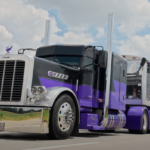Throughout the third quarter, the trucking industry faced a persistent challenge of a significant rise in cargo thefts, as criminals exploited the constraints of the prevailing economic conditions. According to the report released by Verisk Analytics’ CargoNet on November 9, there was a notable 59% year-over-year increase in “supply chain risk events,” encompassing 692 reported incidents across North America. These incidents resulted in the theft of shipments amounting to over $31.1 million. The report emphasized that a considerable portion of this surge was attributed to shipment misdirection attacks, which had similarly contributed to an upswing in the second quarter.
“Instead of striking one load, they’re going after three or four loads at one time,” said Keith Lewis, vice president of operations at CargoNet. “They’re getting bolder; they’re getting more brazen. I wouldn’t say they’re getting desperate, but the value of these goods on the open market is driving up the risk of theft.”
As highlighted in the CargoNet report, theft occurrences surged across all the categories it monitors. Strategic events experienced a remarkable 430% year-over-year increase, while thefts involving loaded conveyances saw a 4% rise.
“What we’re seeing is identity theft, hacking of systems, whether it be a load board or a federal government database,” Lewis said. “They’re using the vulnerabilities in our supply chain, which is moving at a rapid pace. Anytime you’re moving something at a rapid pace, there’s obviously more opportunities to attack it.”
Lewis observed that criminals have traditionally exploited established industry practices to pilfer cargo. However, there is now a discernible trend where they are combining various tactics to enhance the effectiveness of their attacks.
@CargoNet has recorded 692 events across the United States and Canada in the third quarter of 2023, a 59% increase when compared to the third quarter of 2022. Like in the second quarter of 2023, much of the increase is due to… https://t.co/JYIw28vq8o pic.twitter.com/BA2ASSdam3
— CargoNet (@CargoNet) November 9, 2023
“We’re definitely seeing the continued spread and evolution of strategic thefts — the fictitious pickups, the fraudulent thefts,” said Danny Ramon, intelligence and response manager at Overhaul.
Ramon pointed out that criminals continually adapt the specific methods they use, countering efforts to deter them in what he characterizes as an ongoing “cat-and-mouse” game. Additionally, he highlighted that theft activity is expanding into new regions, and there is a growing number of reports indicating incidents of violence.
“When these thieves aren’t able to obtain it, when there’s nobody around, they will resort occasionally to violence,” Ramon said. “We are tracking at least one crew right now that has resorted to violence in California. We’ve seen some violence over-the-road regarding pilferages in Arizona as well.”
Ramon cautioned that the problem extends beyond the trucking sector, as there is also a rising trend of thefts in rail freight across an expanding geographical area, often accompanied by instances of violence. However, obtaining comprehensive data on this matter has proven challenging, as rail companies typically do not regularly report theft incidents.
“We’re continuing to see this trend in the same direction that we’ve seen since third and fourth quarter of 2022,” said Scott Cornell, transportation lead and crime and theft specialist at Travelers. “The strategic thefts in particular [are] continuing to be a constant issue. When you look at the techniques that they’re using, the methods that they’re using repetitively, we’re seeing the industry really try to scramble to respond.”
Cornell, who serves as the vice chairman for the Transported Asset Protection Association Americas, emphasized his involvement in the organization’s initiative to establish standards for freight brokers, aimed at enhancing safety. He underscored the significance of proactive measures in minimizing risks within the industry.
“I don’t see anything to indicate that this is going to slow down,” Cornell said. “When you look at some of the predictions that are out there from an economic standpoint, specifically to the trucking industry, to the transportation industry, cargo thieves seize on those moments. The tougher the industry has it, the more they will try and take advantage of that.”
Cornell highlighted that the economy plays a significant role in shaping the strategies of cargo thieves. He pointed out that these criminals closely track market trends, stealing goods based on fluctuations in demand and prices. Additionally, disruptions and slowdowns in the supply chain can create market shifts that opportunistic criminals are quick to exploit.
“When things get desperate, we don’t pay as much attention to the details,” said Brent Hutto, chief relationship officer at Truckstop. “So you’ve got an industry that’s not as profitable today in freight as it was a year ago, and maybe a year and a half ago, cause all this started happening last October; we’re over a year into it.”
Hutto sees the industry undergoing a technological revolution marked by rapid automation of data to enhance efficiency. However, he cautioned that the industry’s growing reliance on automation creates additional opportunities for criminals to launch attacks. Moreover, he pointed out that the diverse nature of the industry exacerbates the problem, as it hinders the implementation of a standardized approach to technology security.
“The bad actors go in and attack where systems are weakest,” Hutto said. “They’ll go after certain segments of the market where they know that those types of players don’t have the technology to fight.”





